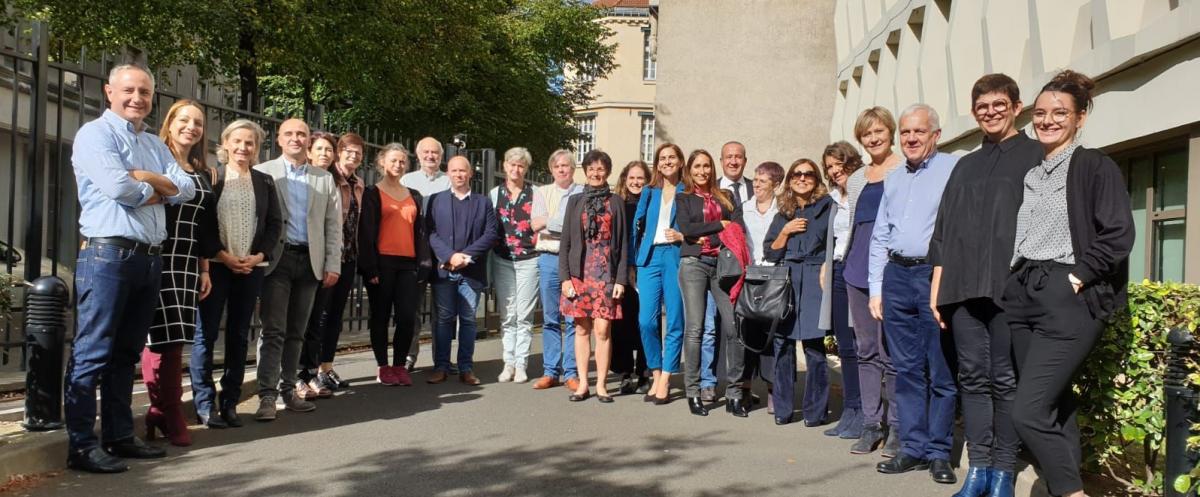- Home
- Worldwide
- CIRAD worldwide
- Projects
- Gender-SMART project
A European partnership on gender issues in science - Gender-SMART

Consortium meeting in Paris, 2019 © CIRAD
Issues
For several decades, fighting gender inequality and empowering women have been top of the global and European agendas. As the European Commission marks 20 years of operations surrounding gender issues in the field of research and innovation, in 2018, France confirmed its commitment to gender equality in various sectors of its national and foreign policy. The Ministry of Europe and Foreign Affairs has committed to invest 50% of public development aid in operations aimed at reducing gender equality between now and 2022.
At CIRAD, recent initiatives bear witness to the organization's determination to address such issues, as part of its social responsibility strategy CIRAD general management and social partners signed a corporate agreement on gender equality in the workplace in late 2017. This high point was followed by other pivotal institutional commitments such as the appointment of an officer for gender equality in June 2018, the inclusion of gender aspects in the organization's scientific and partnership strategy, and the launch of the EU Gender-SMART project.
Description
The seven partner organizations are drafting action plans to change their practices in terms of both institutional functioning and the content of their research, teaching and research funding operations. This is intended to make the organizations more inclusive and responsible and ensure better working conditions, hence boosting creativity.
The action plan drafted by CIRAD centres on three pillars.
Integrating gender equality into the organization's governance and internal operations
In response to the very clear existence of gender-related stereotypes and the resulting bias in terms of how the organization functions, CIRAD has undertaken to build a work environment that guarantees gender equality (establishment of a watch, listening and warning facility has been set up to tackle sex discrimination, distribution of a value charter, management training). It has also has committed to introduce inclusive recruitment and employment procedures (gender balance in all professions, equal pay, gender-balanced representative and decision-making bodies ) and to support women's careers more effectively, to enable them to access management positions and geographical mobility. The project is launching a debate on work organization, to ensure a better work-life balance (time charter, right to disconnect, parent-friendly measures).
Including gender aspects in scientific and partnership strategy
Women play a vital role in agriculture and development worldwide. Integrating gender issues (gender-based distribution of roles, reasoning, constraints, and access to and control over resources) into the organization's scientific and partnership strategy is now a priority. The aim is to produce analyses that will enable an understanding of gender relations in agriculture, and to promote women's contributions to research and development projects as well as men's in research and development projects. Since gender-aware research generates more detailed, comprehensive knowledge of the issues CIRAD works to address, it should boost the relevance, quality and impact of our work.
Promoting CIRAD's work on gender equality issues
CIRAD's external communication strategy should reflect the fact that gender equality is now at the top of its agenda. It should also act as a driver to inspire its various scientific and development partners, donors and line ministries.
Expected impacts
- Men and women will have equal career opportunities and decision-making power.
- Institutional strategies and research will be gender-aware and generate inclusive innovation processes.
Contract partners
Six partners from the research, education and research funding sectors tasked with implementing gender action plans: CICYTEX (Centro De Investigaciones Cientificas Y Tecnologicas De Extremadura - Spain), CIHEAM-Bari (Centro Internazionale Di Alti studi Agronomici Mediterranei - Italy), Teagasc (Agriculture And Food Development Authority - Ireland), WUR (Wageningen University and Research - Netherlands), CUT (Cyprus University of Technology - Cyprus), ANR (Agence nationale de recherche - France)
Two technical partners specializing in gender and institutional change: Yellow Window (Belgium), ISAS (Institute of Sociology, Czech Academy of Sciences – Czech Republic)
























